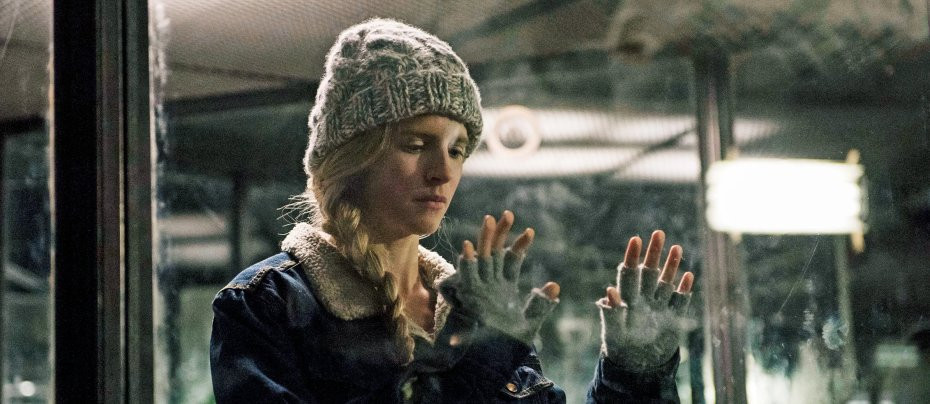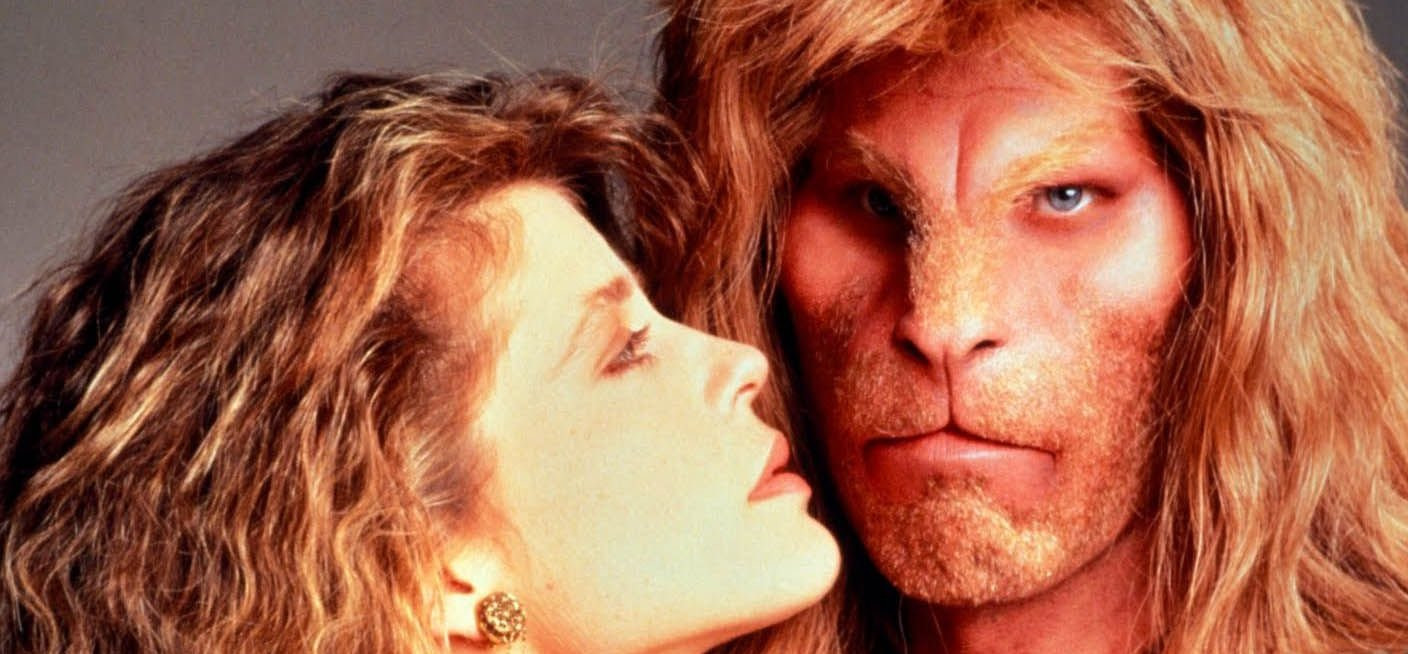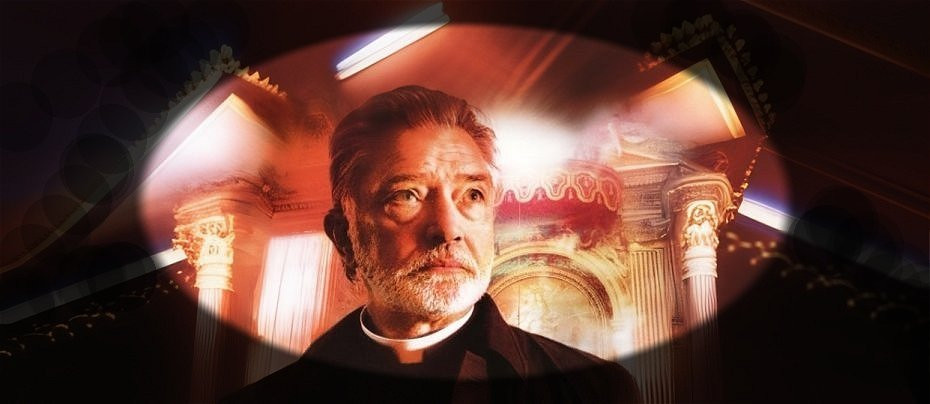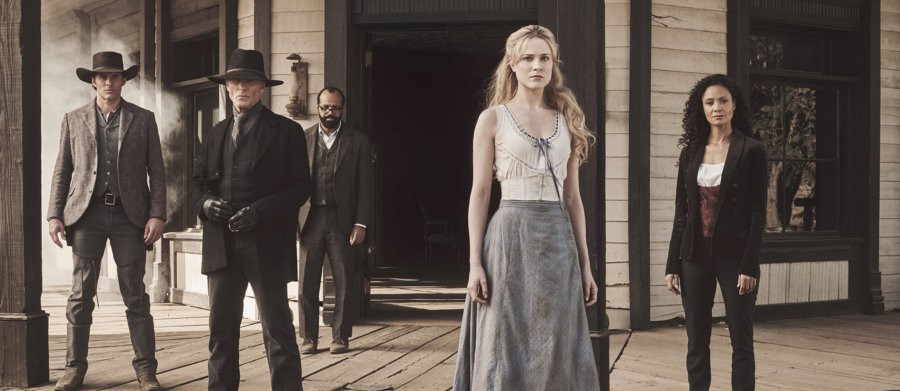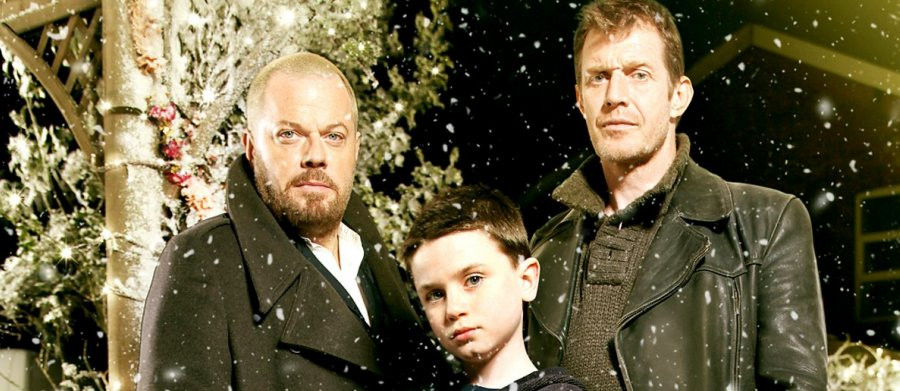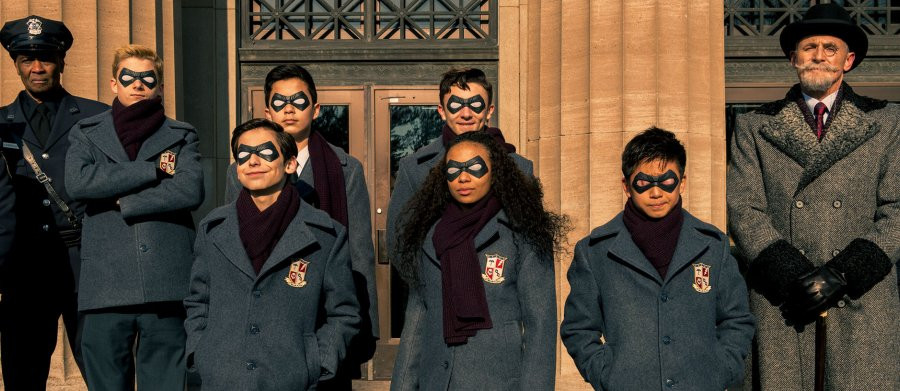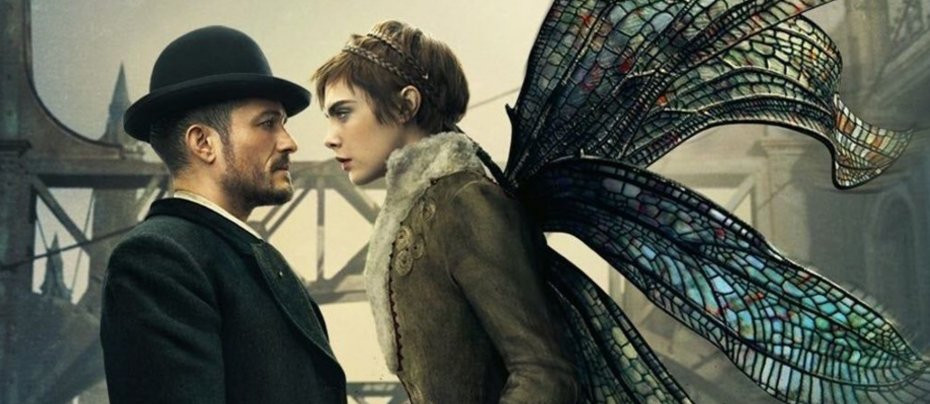
Carnival Row
2019 - United StatesThere is no disguising that the striking visual style of the production depends a great deal on CGI, but quite a bit of artistry has gone into it and the images stick in the mind
Carnival Row review by John Winterson Richards
Subject to the obvious big difference between them, Amazon's Carnival Row has much in common with the Netflix Arcane. Both are set primarily in oligarchal city-states with a more or less Victorian level of technology and civilisation in alternate universes in which forms of magic are acknowledged as physical realities. Both have storylines set among the poor and among the powerful, with corruption at either end of the spectrum.
That big difference is, of course, that Carnival Row is live action where Arcane is animated. This gives Arcane an advantage in terms of being able to deploy greater flexibility, but Carnival Row has its own distinctive visual style thanks to the imaginative use of CGI.

This is a spoiler light overview of the first season of Carnival Row. The great strength of the season is its "world building." It establishes very quickly that there is a complex historical, cultural, and even political background to the story.
The great surprise is therefore that it is not an adaptation of a book, even a "comic book," that provides a lot of detail. It is an original work, based on no more than a "spec script," a speculative script as opposed to a commissioned script, for a feature film that has never been made.

One can see a number a number of influences. The fictional Republic of the Burgue is obviously the late 19th Century London of Sir Arthur Conan Doyle and Joseph Conrad, misty, cosmopolitan, mysterious, and struggling to cope with both prosperity and poverty. One is frequently reminded of the Johnny Depp film From Hell, itself based on a "comic book," or rather "graphic novel," about the real life hunt for "Jack the Ripper."
One is also tempted to see references to the work of the highly acclaimed feature film director Guillermo del Toro (Hellboy), who was at one point attached to the project, but since he left at a relatively early stage one should be on guard against too much conjecture on this point.
A few years before the main story begins, the Republic of the Burgue sent an army to another continent to support "the Fae" against a rather mysterious foe known as "the Pact." A small part of this war is later shown in flashback. The Fae, as their name suggests, are a fairylike folk, complete with wings. The Pact are, or control, werewolf type creatures, except they change in response to injections rather than with phases of the moon. With fairies as allies and werewolves as enemies, needless to say the war does not go well for the Burgue.

The Republic abandons its allies and evacuates the continent where they live, only for its army to be followed home by the consequent flood of Fae refugees. Their presence in the poorer districts of the Burgue stir up racial tensions, which are in turn exploited by politicians at the highest levels. This leads to some rather heavy handed parallels with modern debates about immigration and multiculturalism. Some points are well made, but the caricatures on both sides rather beat it into us with whom we are supposed to be sympathising.
Our hero, orphan, war veteran, and Police Inspector Rycroft Philostrate - there are some great names in Carnival Row - is a man who, for reasons that soon become apparent, walks both sides of a thin line. Since Philo is played by Orlando Bloom, an actor most famous for playing an Elf, those reasons are in fact pretty obvious from the start.

There is something similarly Elfin about Cara Delevingne's slightly androgynous beauty and she certainly looks the part of Philo's Fae wartime lover, Vignette Stonemoss. Having eventually escaped from the Pact herself and come to the Burgue as a worse than penniless refugee - she is in debt for her passage - she is, understandably, not best pleased to discover that her beloved is still alive after deliberately making her believe that he has been dead for the last few years.
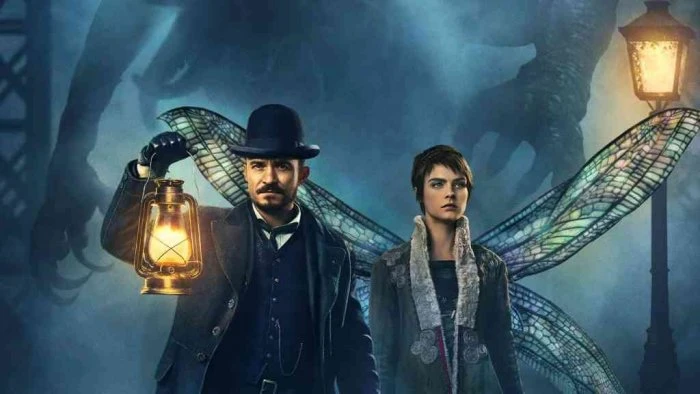
Philo is investigating a series of apparently racist attacks on Fae refugees in the poor districts of the Burgue, notably the eponymous Carnival Row. This is the disreputable part of Town which is secretly very attractive to a number of supposedly respectable citizens. Philo's sympathy and concern for the Fae are not shared by many of his colleagues in the Burgue Constabulary.
Needless to say, his investigations soon lead him to dark doings in High Places, as well as to some discoveries about his own past.
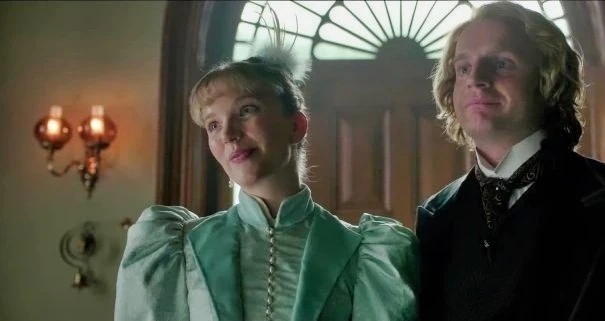
Meanwhile, to pay her transit debt, Vignette is at first indentured to an apparently wealthy brother and sister as a house servant. This does not go well. The brother, Ezra Spurnrose, is a thoroughly nasty piece of work. On top of everything else, he is bad at business: his shipping investments were not the success he assumed, so his sister, Imogen, begins to cultivate their wealthy neighbour, Agreus Astrayon, a Faun. Known offensively as "pucks," Fauns are another widely despised race. The uncomfortable scenes in which he tries to integrate with the Burgue's snobbish "high society" are among the highlights of the season.
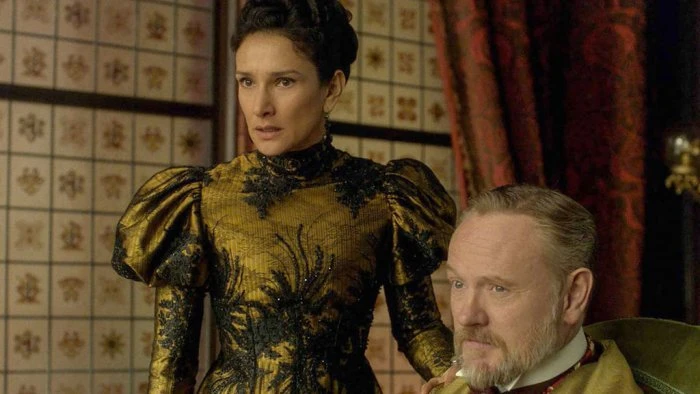
The biggest name in the supporting cast is Jared Harris, who is suitably commanding, at least in public, as Absalom Breakspear, the Chancellor of the Republic. Indira Varma, who proved her ability to play ruthless women in Game of Thrones, is in fine Lady Macbeth form as his even more ambitious wife, Piety. Ronan Vibert is the Leader of the Opposition, Ritter Longerbane, who has a daughter, Sophie, played by Caroline Ford. As it happens, the Breakspears have a son of about the same age, Jonah, played by Arty Froushan. Hmm... where might that be leading?
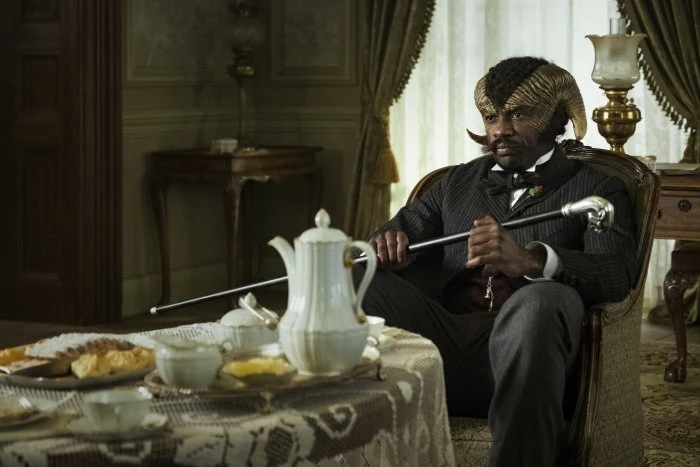
David Gyasi is magnetic, in spite of his make up, as Agreus, maintaining not only a cold dignity but an air of great latent power in the face of constant humiliation. Tamzin Merchant develops Imogen from an initially disagreeable character into someone for whom it is possible to feel a growing sympathy. Andrew Gower is splendidly hissable as her brother, Ezra.
Simon McBurney maintains a nice ambiguity about a broken street entertainer who rises very quickly to political influence. Are we supposed to like him? Care about him? Sympathise with him when he loses his "pets"? Or respect his intelligence and his ability to rise so quickly? Or is he secretly a dangerous and bitter man playing a deep game? Mark Lewis Jones is suitably officious as the Magistrate who commands the Constabulary and Jamie Harris (Jared's brother) is suitably nasty as a racist Constable. The ever watchable Alice Krige brings her strangely ethereal authority to the role of a "Haruspex" or witch employed by Piety.

There is no disguising that the striking visual style of the production depends a great deal on CGI, but quite a bit of artistry has gone into it and the images stick in the mind. There is also a bit of good location work in the Czech Republic, where the production was based.
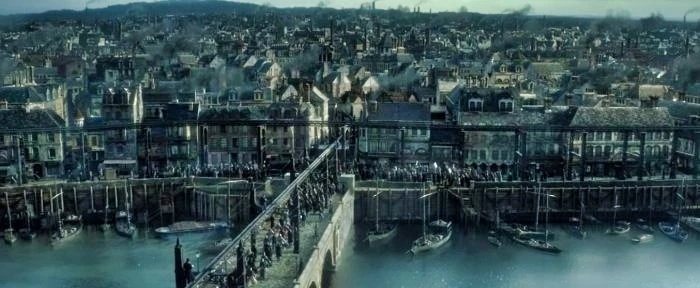
The Republic of the Burgue is given a lot of Victorian gloom. It is nice touch that the city-state's Parliament is like a municipal Council Chamber from that period and the Chancellor wears the robes of a Lord Mayor. By contrast, the scenes in the Fae homeland have a delicate magical air to them.
Another nice touch is that the religion of the Burgue, which is analogous with Christianity, reveres a fairly graphic image of a man hanging from a gallows - which is in essence what a Crucifix really is. The contrast between religious respectability and the hypocrisy revealed on Carnival Row is a major theme, as it often is in films and shows about Victorian England. Whether the Victorians were generally as hypocritical as people today prefer to think is another matter: the point is that it is an established trope which Carnival Row exploits effectively. There also analogues of the terrorist groups that developed within immigrant communities in Victorian London.
The whole thing is certainly good looking, but it takes us some time to find where the real story is. The plot is full of twists and turns, few of which are really surprising. The main thread, the love story of Philo and Vignette, is less interesting than the prickly relationship that develops between Agreus and Imogen, which is also better played. The high politics thread of the Breakspears and the Longerbanes promises much but becomes rather silly in the final episode of the season. Having established that the Burgue is a sophisticated polity the sudden rise to office or influence of characters who have hitherto been notable for being powerless seems rather contrived, and there is at least one twist too many.
That said, the three principal storylines all have potential, even if that potential was far from fully explored by the first season. We are not, so far, given much reason to care about what happens to any of the principals, except perhaps Agreus and Imogen, who both seem at first to be guarded to the point of disagreeable only to reveal themselves as deeply wounded people seeking hope. At the time of writing, filming of the second season wrapped some time ago, but completion was delayed by the coronavirus, and by the huge amount of CGI and post production required in this sort of project. The first season does enough to establish the characters and the world in which they live, but more is required: the second season will need to use them as part of a more compelling story.
Seen this show? How do you rate it?
Seen this show? How do you rate it?
Published on May 3rd, 2022. Written by John Winterson Richards for Television Heaven.


